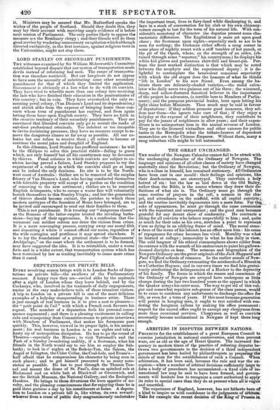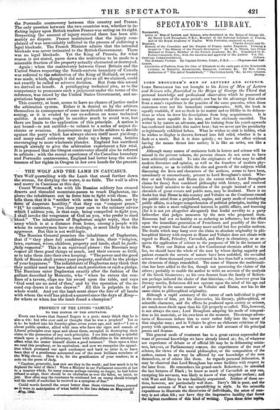ARBITERS IN DISPUTES BETWEEN NATIONS.
PROJECTS for the establishment of a great European Council to exercise jurisdiction in national controversies, and thus prevent wars, are as old as the age of Henri Quatre. The increased fre-. quency in modern times of the practice of referring disputes be- tween two governments to the decision of a third independent government has been hailed by philanthropists as preparing the minds of men for the establishment of such a Council. When arbitration, it has been said, becomes the rule and war the ex- ception—when a number of arbitral-decisions sufficiently large to' form a body of precedents has accumulated—a fixed code Of in• ternational law may be said to have been formed, and govern- ments will hesitate less to recognize a court authorized to apply_ its rules to special cases than they do at present when all is vague and unsettled.
The experience of England, however, has not hitherto been of a kind to inspire us with confidence in the judgments of aibitera: Take for example' the recent decision of the King of Prussia in
the Portendic controversy between this country and France. The only question between the two countries was, whether in in- dicting injury upon British traders France was acting on its right. Respecting the amount of injury received there has been ulti- mately no dispute. France maintained that the injury com- plained of was unavoidably inflicted in the process of enforcing a legal blockade. The French Minister admits that the intended blockade was never intimated to the British Government. There was no legal blockade. Yet the King of Prussia, for what reason is not stated, pares down the restitution to be made to a miserable fraction of the property actually abstracted or destroyed.
-Again : when the controversy between Great Britain and the United States respecting the. South-eastern boundary of Canada was referred to the sudoitration of the King-of Holland, an award was made, which, though it did not give us all we claimed, could not exactly be called an adverse decision. But from this award we derived no benefit. A pettifogging technical plea, as to the competency to pronounce such a judgment under the terms of the reference, was raised by the United States Government, and ne- gotiations began anew. This country, at least, seems to have no chance of justice under the arbitration system. Either it it denied us by the arbiters themselves in consequence of some inexplicable refinement of rea- soning, or it is evaded by our co-referees on some technical quibble. A nation ought to sacrifice much to avoid war, but there are limits to the application of this principle. A nation is not bound—is not entitled—to submit to a series of unjust de- CisiOnS or evasions. Acquiescence may invite arbiters to decide against the party which has always shown itself most yielding ; and many small robberies may make up a large sum, besides encouraging to more wholesale plunder. England has sacrificed enough already to give the arbitration experiment a fair trial. It is proposed that the Oregon controversy should also be referred to arbiters : with the recent experience of the Canadian boundary and Portendic controversies, England had better keep the main- tenance of her rights in Oregon in her own hands for the present.



























 Previous page
Previous page